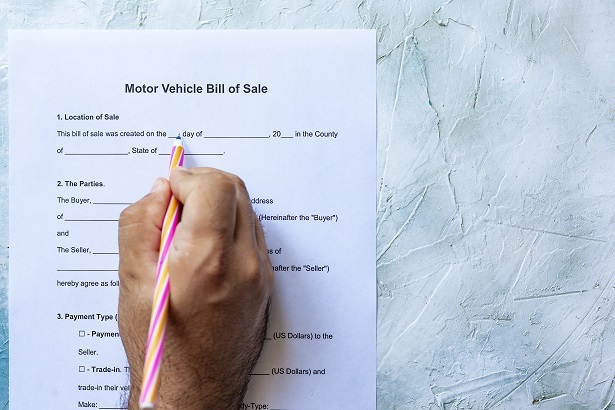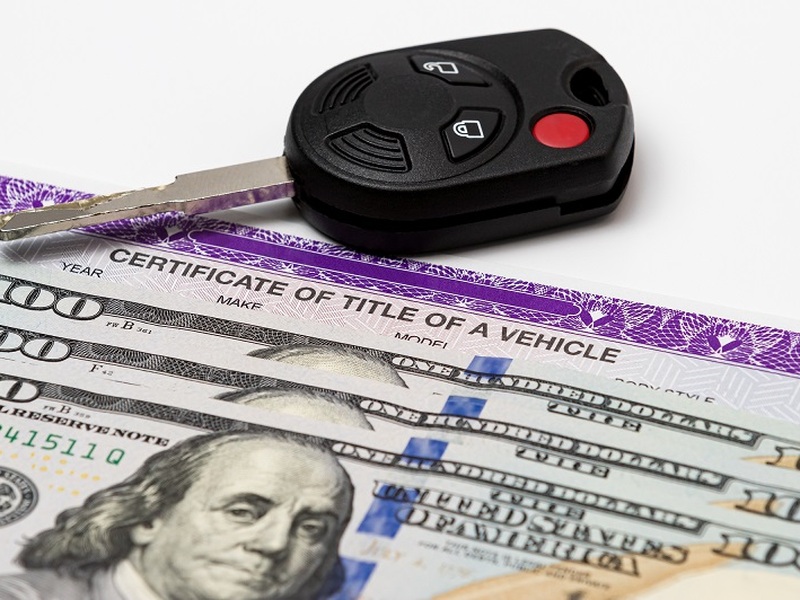If you're a bargain hunter by nature, buying a used car from a private seller can yield an excellent deal. You can scour listings on Craigslist, Facebook, and used car shopping sites or drive around looking for "For Sale" signs on parked vehicles. You may relish the thrill of the hunt, but what happens if you find the perfect vehicle, only to learn the owner doesn't have the car title in his possession? Should you proceed with the purchase or run the other way? Learn how you can buy a car without a title, the risks involved, and what to do if you already purchased a vehicle with no title.
Buying a Car That Has No Title

A car title is a legal document issued for all new cars which officially declares the owner of a vehicle. Normally, when you purchase a new or used vehicle from a dealership or a private seller, the title will be transferred to you. Vehicle title and registration laws vary by state, so it's important to understand the requirements in your area before moving forward and purchasing a car without a title.
According to Auto Blog, there are several routes to take when you're considering purchasing a car without a title. The first one is to do some investigative work on the vehicle. You'll want to obtain the vehicle history report to check the legal status of the car as well as details about the vehicle. Look for discrepancies between what the seller told you and what the vehicle history report shows. You'll also want to contact the DMV and ask for the vehicle's history and title status. To check if the vehicle is stolen, run its VIN number through the National Insurance Crime Bureau's website.

In addition to doing thorough research, you should also complete a bill of sale before purchasing a car without a title. A bill of sale for a car is a legal document that confirms the sale and transfer of possession of a motor vehicle. It should include details of the sale like the buyer and seller's names and contact information, the car's VIN number, mileage, and sale price. It should also specify any special terms for the sale like "as is" condition.
While it's possible to purchase a vehicle without a title, you need to make sure that the reason for the missing title is legitimate. The seller may have simply lost the title, received the vehicle as a gift, or purchased the vehicle from a family member without a proper title transfer. In some cases, the reason for the missing title isn't as benign which is why you want to consider the risks of going through with the purchase.
Risks of Buying a Car with No Title

Even though the seller could claim he has misplaced the title, the reasons for the missing title could be more worrisome. The vehicle may be stolen (definitely run the other way), or it could have a salvage or rebuilt title that the owner doesn't want to disclose. If you question the seller about the status of the vehicle's title and he seems uncooperative or untruthful, it's best to walk away and look for vehicles elsewhere.
The vehicle may not be stolen or damaged, but you should also be aware of a tactic called "title jumping" or "title skipping". According to ItStillRuns, title jumping is an illegal practice when "an unlicensed dealer who wants to avoid detection by the state will buy a car from one person and then sell it to another without putting his name on the title in the interim, as is required by law. The title, therefore "jumps" from the original owner to the new owner, as if the car was sold directly rather than through the dealer." If the title to your car shows the previous owner as someone besides the party you bought it from, you may have a jump title. Buying a car with a jump title puts you at risk of fraud.

How to Reduce the Risks
In order to protect yourself from a big headache (or potential crime), you need to do your due diligence before buying from a seller who doesn't have the vehicle title. In addition to getting the vehicle history report and running the car's VIN to make sure it's not stolen, you should be cautious in how you pay for the car. It's safer to use a check or bank draft to pay for the vehicle compared to paying cash because it will serve as proof of purchase. You can also place the funds in an escrow until the terms of the sale are met.
Make sure to get a professional inspection on the vehicle which may reveal if the car has serious damage and a possible salvage title that the seller doesn't want to disclose. For the most peace of mind, consider avoiding buying a car without a title, entirely. Go through a reputable, licensed dealership or a trustworthy private seller who can provide a clean vehicle title.
You Bought a Car Without a Title, Now What?

What if you purchased a vehicle with no title before reading this and understanding the risks? First, don't panic. You will likely be able to resolve the situation by communicating with the seller or working with your local DMV. If you're able to get back in touch with the seller, you should ask if they can fill out a Duplicate Title Request from the DMV. If the seller does not reply or claims they never had the title, you can consult with your local DMV about options like tracking down the previous car title or purchasing a title bond.
Tracking down the previous car title will once again take some investigative work. According to Auto Blog, if the seller never registered the car, you'll have to find the state where the vehicle was last registered using the vehicle history report, contact the DMV in that state, and explain why you need information for the vehicle's last owner. Once you obtain this information, you'll be able to contact the last owner and ask them to request a duplicate title for your vehicle.
Finally, you may be able to use the bonded title process to claim ownership of the vehicle. Obtaining a title bond is an option offered in some states which adds a layer of security to an otherwise risky purchase. For example, to obtain a title bond in Texas, the vehicle must be in your possession and cannot be considered junked, nonrepairable, or otherwise ineligible for a title. If the vehicle is eligible, you would fill out a bonded title application from your local department of motor vehicles, provide evidence of ownership like the bill of sale, and pay a fee to complete the process.


